Remove HyperSearch browser hijacker virus from your computer by reading my virus removal guide.
First and foremost, let’s find out what HyperSearch is before we can discuss how to remove it. Further knowledge of this threat will aid you in recognizing similar threats quickly in the future.
By taking a closer look at it, it becomes apparent that HyperSearch is more than just a mere browser tool; it is a browser hijacker. This means that everytime you open your internet browser, it secretly compels you to visit a specific website (HyperSearch).
This happens after it has been installed by slyly modifying your web browser’s settings.
The sneaky thing about HyperSearch is how it gets onto your PC. Sometimes, people unknowingly add this software as they might think that their browsing experience could be better or when it comes bundled with other programs so they do not see any harm in installing them. Once installed however, such programs change your search results and home pages which now point to the HyperSearch without your consent.
What makes this even annoying is that while trying to go back to your usual sites, you still keep ending up on this hijacker instead. That’s not just inconvenient; also remember that there are privacy issues associated with spammers who always track users’ online activities.
What exactly is HyperSearch?
Positioning itself as an easy-to-use homepage option for users looking for smooth browsing experiences, HyperSearch is not what it claims to be on the surface. This software operates as a browser hijacker at its core.
When we say browser hijackers modify settings within your web browser without receiving permission from the user, one of clear indications of their influence can tell when they change the default search engine and take over any new tabs’ homepages, redirecting them to their own site — in this case: HyperSearch.
HyperSearch browser hijacker
Summary:
- HyperSearch presents itself as a handy homepage option and search tool.
- It claims to offer seamless browsing experiences to users.
- It is a browser hijacker.
- It modifies settings within your web browser without permission.
- It alters the default search engine and takes over the new tab’s homepage.
- It redirects the homepage to its page.
HyperSearch domain WHOIS record:
We were unable to provide WHOIS data on this domain.
HyperSearch domain age:
We were unable to provide WHOIS data on this domain.
Why is HyperSearch Harmful?
Although HyperSearch might initially appear harmless or useful, it conceals its primary intent: data collection. The browser hijacker is designed to gather various data from your web activities. This could range from your search histories, visited websites, and interactions on specific sites to personal data like location, IP address, and more.
The data amassed by HyperSearch isn’t merely stored; it’s actively monetized. It is often sold to advertising networks, thereby allowing tailored ads to be shown to you, often in an intrusive manner. The barrage of targeted ads isn’t just annoying; it can slow browsing and expose you to potential threats.
Additionally, because HyperSearch extracts data without users’ explicit consent, it’s tagged as a potentially unwanted program (PUP). The PUP classification is reserved for programs that might not be malicious, like viruses, but can pose risks or annoyances to the user.
Summary:
- HyperSearch is a browser hijacker that collects data from users’ web activities
- It collects information such as search histories, visited websites, and personal data like location and IP address
- The collected data is monetized and sold to advertising networks for targeted ads
- This can lead to annoying and intrusive ads, as well as potential browsing issues and security threats
- HyperSearch is considered a potentially unwanted program (PUP) because it extracts data without explicit user consent
How Does HyperSearch Spread?
Even though HyperSearch might seem harmless or beneficial at first sight, it masks its major purpose – to collect data. Most often, browser hijackers extract all possible information from your web activities.
It can include the search history, visited pages and actions in some websites to personal data like our location and IP address.
The collected information by HyperSearch is not just stored; it is actively monetized. By selling these data to advertisement networks, you are able to see personalized ads most times annoyingly popping up on your device. The incessantness of directed advertisements does not only bother; but likewise slows down the internet while exposing you to threats.
Additionally, as HyperSearch takes hold of users’ data without their explicit permission it classifies it as potentially unwanted program (PUP). However, PUPs are programs that may not be harmful like viruses but may pose risks or annoyances to a user.
Summary:
- HyperSearch is a browser hijacker that captures user’s online activity
- It gathers such information as search histories, visited sites and also individuals’ private details like places of residence and IP addresses
- The information gathered is commercialized through selling them advertising agencies hence leading to targeted ads
- These are irritating and intrusive ads that can result in browsing issues as well as security threats
How to remove HyperSearch browser hijacker?
Step 1: Remove the HyperSearch browser extension
First, we will remove the extension for HyperSearch from the browser. Follow the instructions for the browser you have set as your default browser. Make sure you remove the permission for HyperSearch from the browser settings. To do so, see the steps below for the corresponding browser.
 Google Chrome
Google Chrome
- Open Google Chrome.
- type: chrome://extensions/ in the address bar.
- Search for the “HyperSearch” browser extension and click the “Remove” button.
It is essential to check every extension installed. If you do not know or do not trust a installed browser extension, remove or disable it.
 Firefox
Firefox
- Open Firefox browser.
- type: about:addons in the address bar.
- Search for the “HyperSearch” browser add-on and click the “Remove” button.
It is crucial to check every addon installed. If you do not know or do not trust a specific addon, remove or disable it.
 Microsoft Edge
Microsoft Edge
- Open the Microsoft Edge browser.
- type: edge://extensions/ in the address bar.
- Search for the “HyperSearch” browser extension and click the “Remove” button.
It is essential to check every extension installed. If you do not know or do not trust a specific extension, remove or disable it.
 Safari
Safari
- Open Safari.
- In the top left corner, click on the Safari menu.
- In the Safari menu, click on Preferences.
- Click on the Extensions tab.
- Search for the “HyperSearch” browser extension and click the “Uninstall” button.
It is vital to check every extension installed. If you do not know or do not trust a specific extension, uninstall the extension.
Step 2: Remove HyperSearch notifications
 Remove HyperSearch notifications from Google Chrome
Remove HyperSearch notifications from Google Chrome
- Open Google Chrome.
- In the top-right corner, expand the Chrome menu.
- In the Google Chrome menu, click on Settings.
- At the Privacy and Security section, click on Site settings.
- Next, click the Notifications settings.
- Remove HyperSearch by clicking the three dots on the right next to the HyperSearch URL and Remove.
→ Protect your computer with Malwarebytes.
 Remove HyperSearch notifications from the Android
Remove HyperSearch notifications from the Android
- Open Google Chrome
- In the top-right corner, find the Chrome menu.
- In the menu, tap Settings, and scroll down to Advanced.
- In the Site Settings section, tap the Notifications settings, find the HyperSearch domain, and tap on it.
- Tap the Clean & Reset button and confirm.
→ See the next step: Malwarebytes.
 Remove HyperSearch notifications from Firefox
Remove HyperSearch notifications from Firefox
- Open Firefox
- In the top-right corner, click the Firefox menu (three horizontal stripes).
- In the menu, click on Options.
- In the list on the left, click on Privacy & Security.
- Scroll down to Permissions and then to Settings next to Notifications.
- Select the HyperSearch URL from the list, and change the status to Block, save Firefox changes.
→ See the next step: Malwarebytes.
 Remove HyperSearch notifications from Edge
Remove HyperSearch notifications from Edge
- Open Microsoft Edge.
- Click on the three dots in the top right corner to expand the Edge menu.
- Scroll down to Settings.
- In the left menu, click on Site permissions.
- Click on Notifications.
- Click on the three dots on the right of the HyperSearch domain and Remove them.
→ See the next step: Malwarebytes.
 Remove HyperSearch notifications from Safari on Mac
Remove HyperSearch notifications from Safari on Mac
- Open Safari. In the top left corner, click on Safari.
- Go to Preferences in the Safari menu and open the Websites tab.
- In the left menu, click on Notifications
- Find the HyperSearch domain and select it, and click the Deny button.
→ See the next step: Malwarebytes.
Step 3: Uninstall HyperSearch software
In this second step, we will check your computer for adware software. In many cases, adware is installed by you as a user yourself. This is because adware is bundled with other software you can download for free from the Internet.
HyperSearch is then offered as a helpful tool or an “offering” during installation. If you do not pay attention and quickly click through the installation process, you will install adware on your computer. Thus, this is done misleadingly. If you want to avoid this, you can use Unchecky software. Using the steps below, check for adware installed on your computer and remove it.
Windows 11
- Click on “Start.”
- Click on “Settings.”
- Click on “Apps.”
- Lastly, click on “Installed apps.”
- Search for any unknown or unused software in the list of recently installed apps.
- On the right-click on the three dots.
- In the menu, click on “Uninstall.”
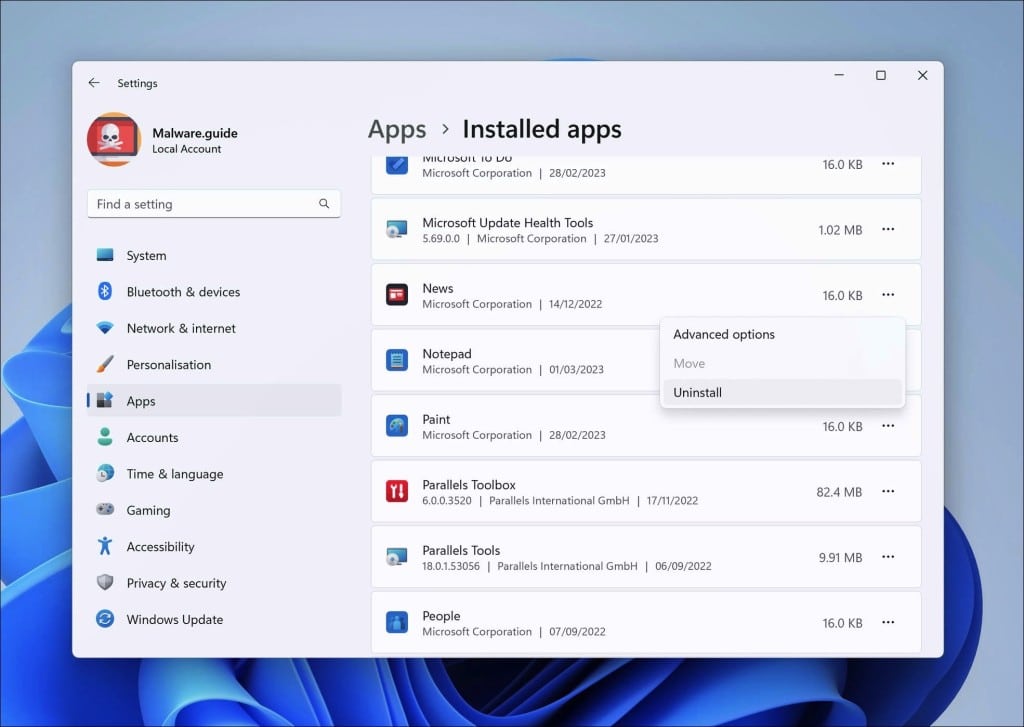
Windows 10
- Click on “Start.”
- Click on “Settings.”
- Click on “Apps.”
- In the list of apps, search for any unknown or unused software.
- Click on the app.
- Lastly, click on the “Uninstall” button.
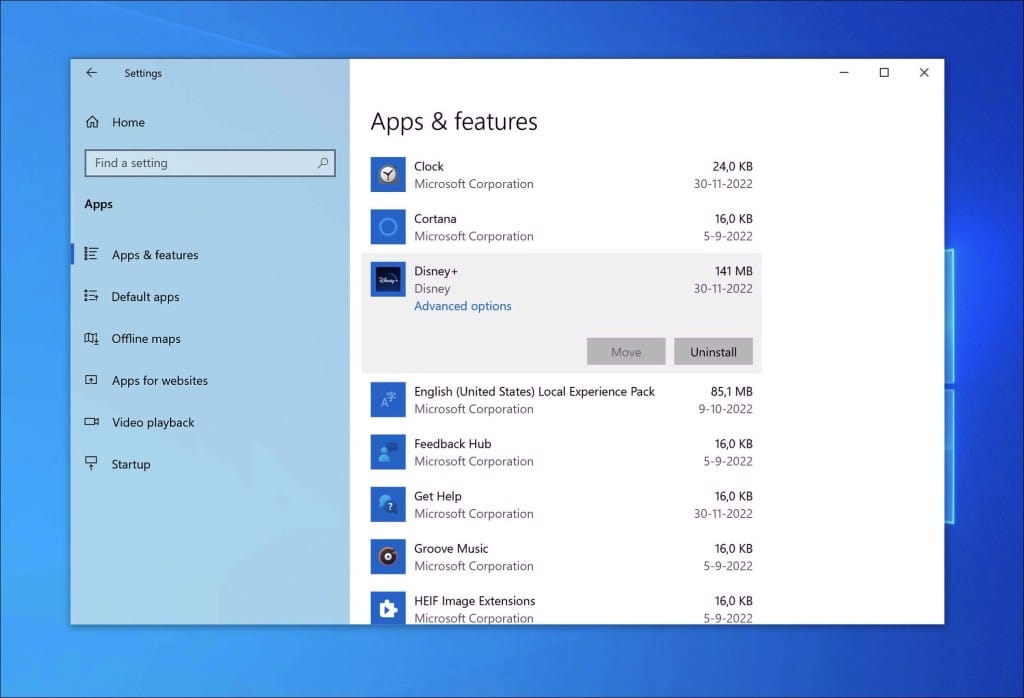
Step 4: Scan your PC for HyperSearch
Now that you have uninstalled adware apps, I advise you to check the computer for any other malware for free.
It is not recommended to remove malware manually because it can be difficult for non-technical people to identify and remove all the traces of malware. Manually removing malware involves finding and deleting files, registry entries, and other often hidden details. It can damage your computer or leave it vulnerable to further attacks if not done correctly. So, please install and run the malware removal software, which you can find in this step.
Malwarebytes
Use Malwarebytes to detect adware such as HyperSearch and other malware on your computer. The advantage of Malwarebytes is that it is free to detect and remove malware. Malwarebytes is capable of removing different types of malware. In addition to removal, it also offers protection against malware. I recommend using Malwarebytes if only to have checked your computer for malware once.
- Download Malwarebytes
- Install Malwarebytes, and follow the on-screen instructions.
- Click Scan to initiate a malware scan on your PC.
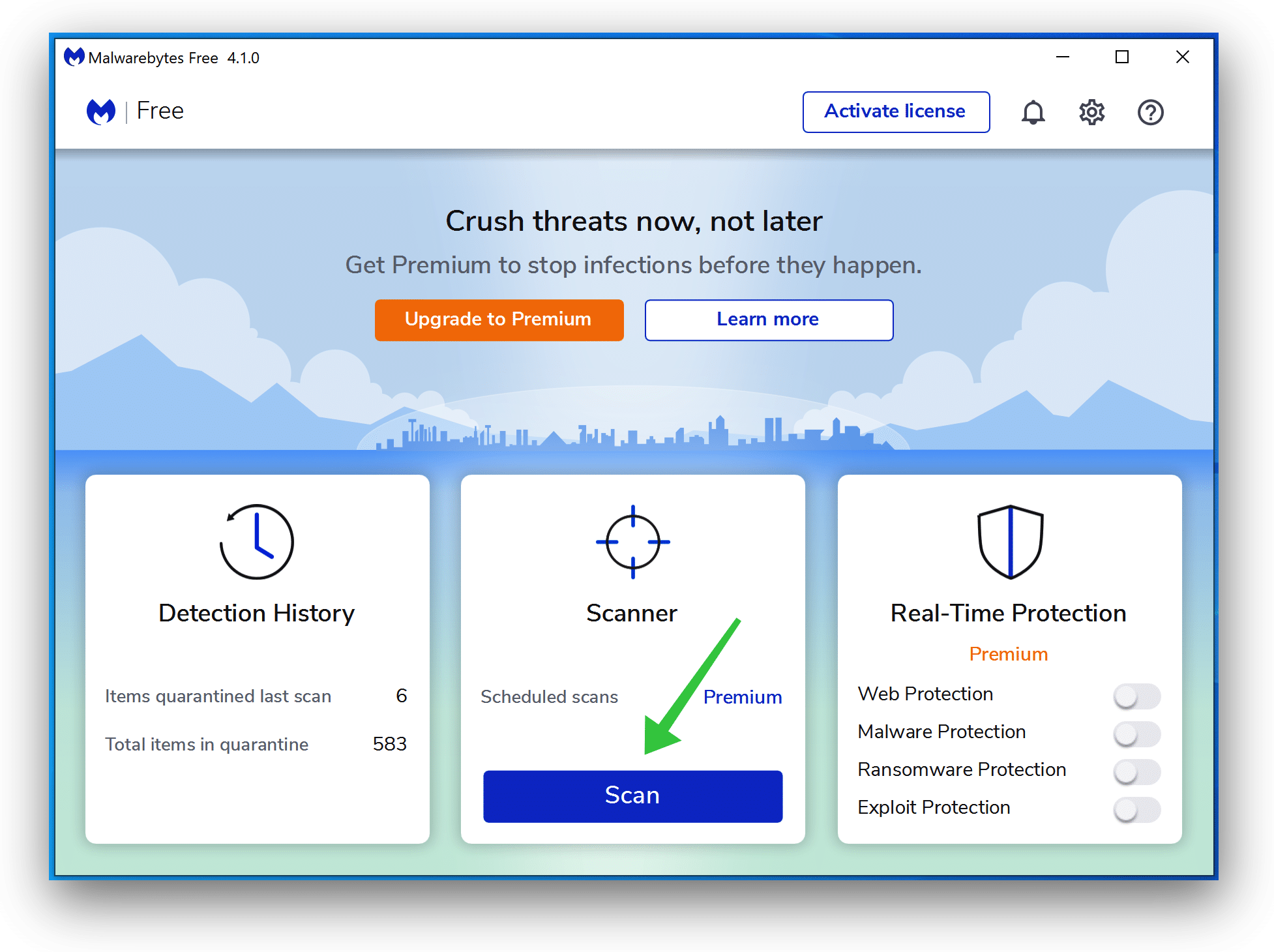
- Wait for the Malwarebytes scan to finish.
- Once completed, review the malware detections.
- Click Quarantine to continue.
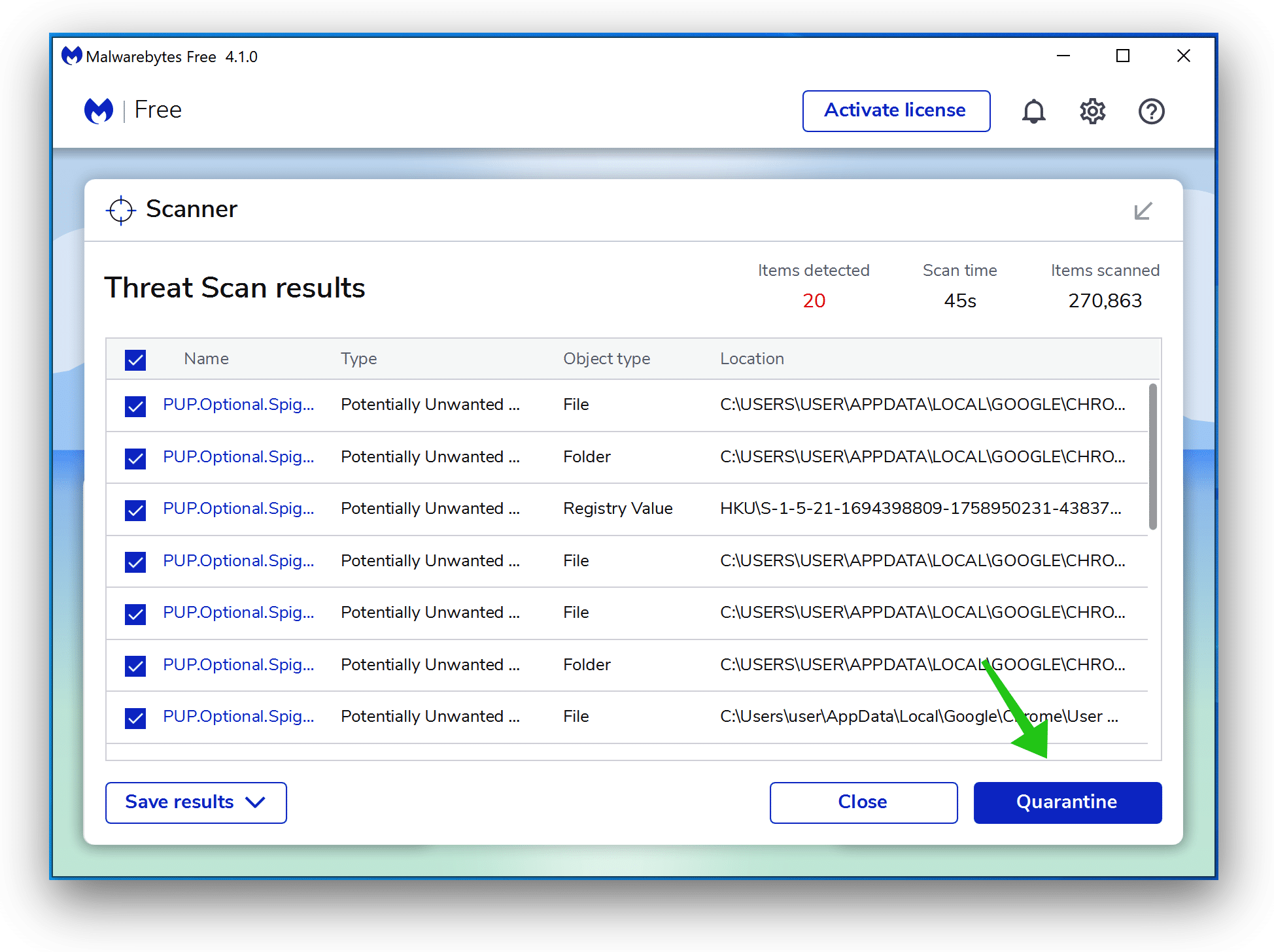
- Reboot Windows after all the malware detections are moved to quarantine.
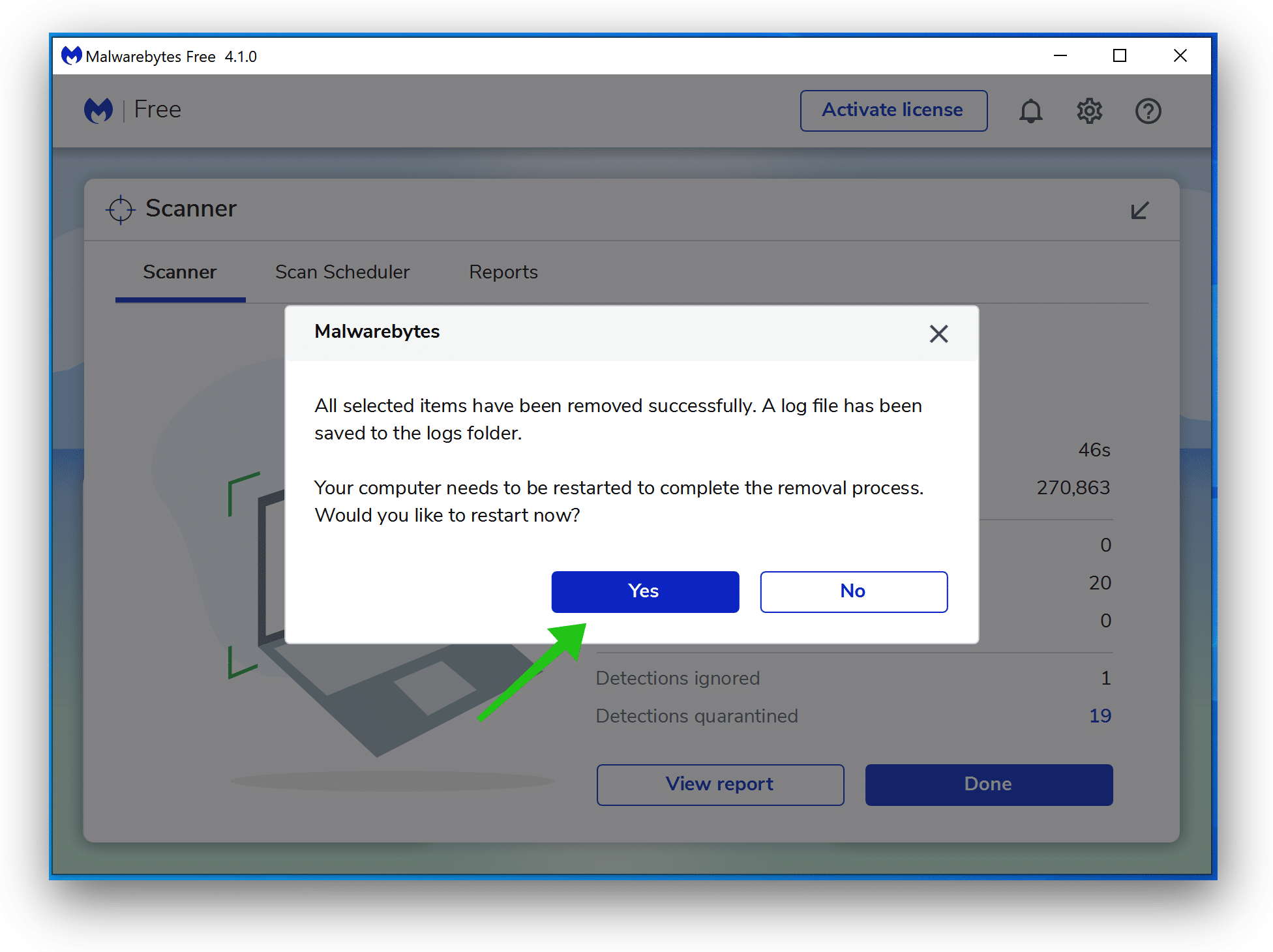
Combo Cleaner
Combo Cleaner is a cleaning and antivirus program for Mac, PC, and Android devices. It is equipped with features to protect devices from various types of malware, including spyware, trojans, ransomware, and adware. The software includes tools for on-demand scans to remove and prevent malware, adware, and ransomware infections. It also offers features like a disk cleaner, big files finder (free), duplicate files finder (free), privacy scanner, and application uninstaller.
Follow the installation instructions to install the application on your device. Open Combo Cleaner after installation.
- Click the "Start scan" button to initiate a malware removal scan.
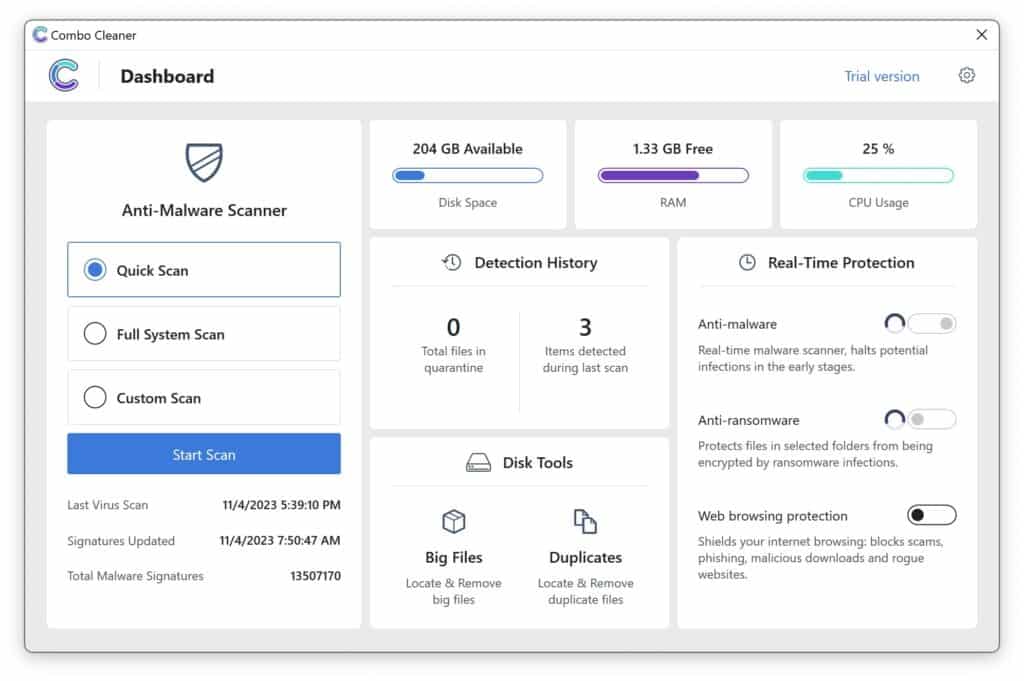
- Wait for Combo Cleaner to detect malware threats on your computer.
- When the Scan is finished, Combo Cleaner will show the found malware.
- Click "Move to Quarantine" to move the found malware to quarantine, where it can't harm your computer anymore.
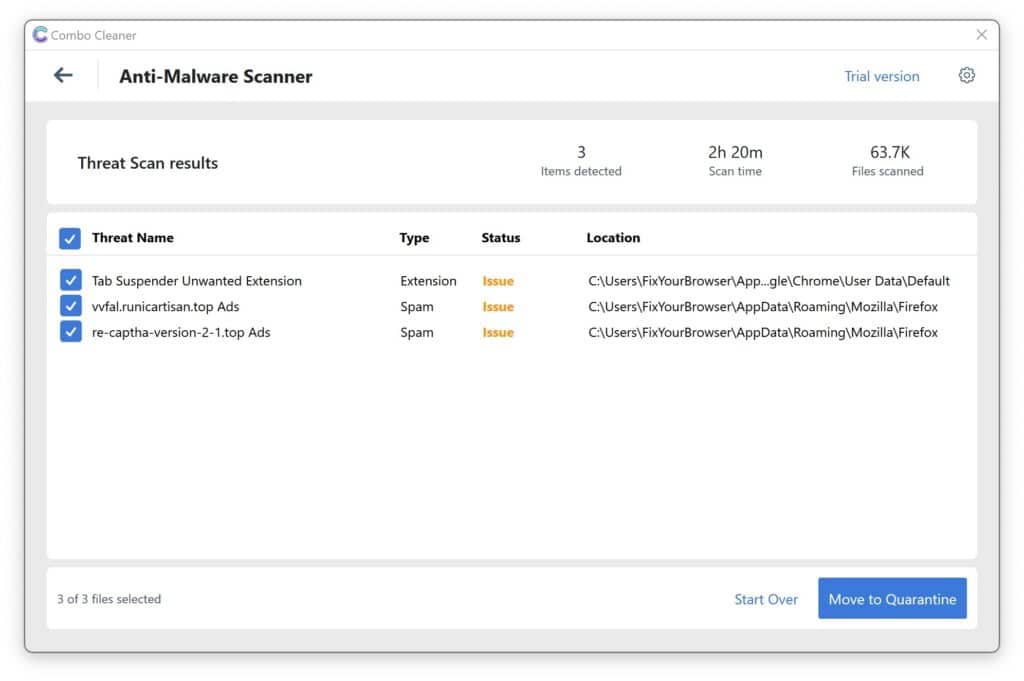
- A malware scan summary is shown to inform you about all threats found.
- Click "Done" to close the scan.
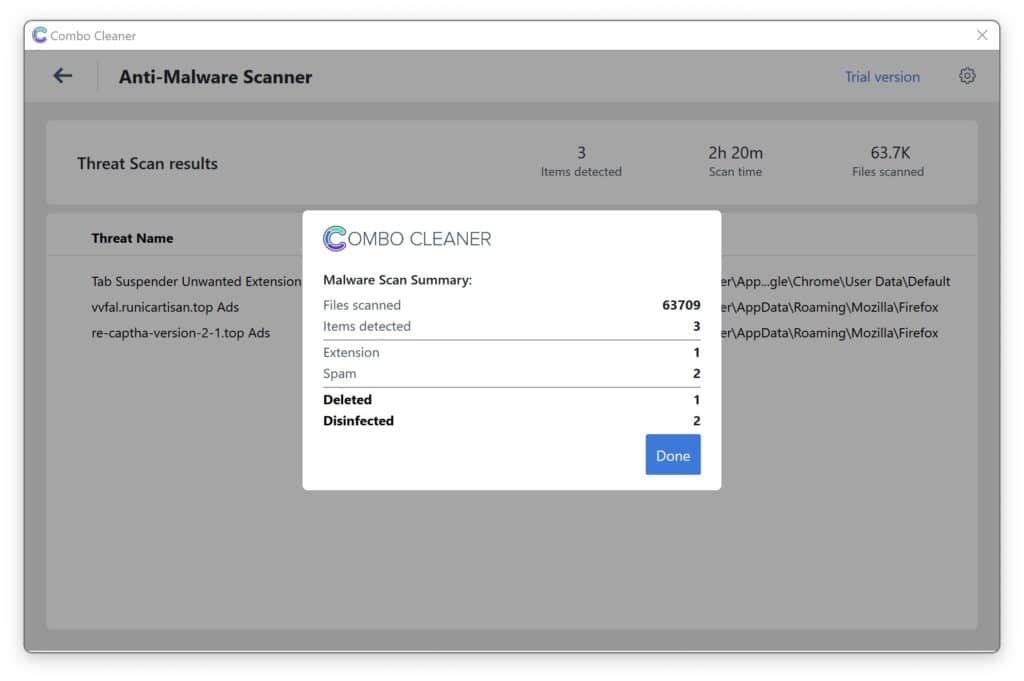
Use Combo Cleaner regularly to keep your device clean and protected. Combo Cleaner will remain active on your computer to protect your computer from future threats that try to attack your computer. If you have any questions or issues, Combo Cleaner offers a dedicated support team available 24/7.
Thank me later 🙂 Please support my work and share this removal instruction with other people. Make sure other people do not become a victim of the HyperSearch browser hijacker virus.